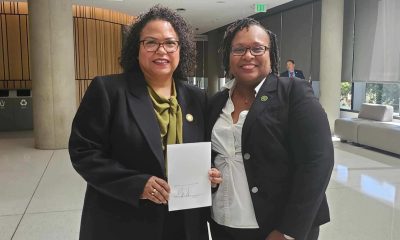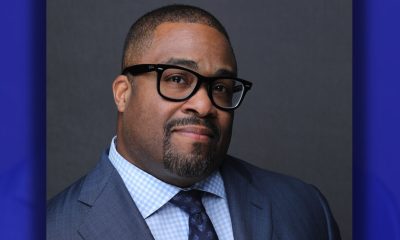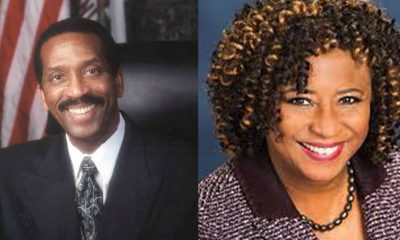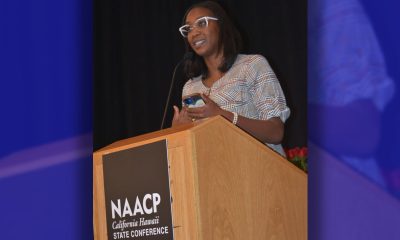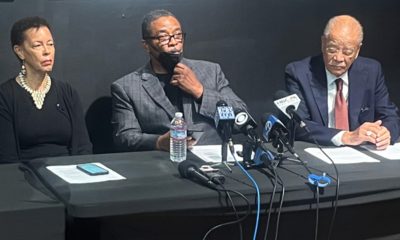Politics
Broader Hiring Practices for Ex-Offenders Receive Bipartisan Support
By Freddie Allen
Senior Washington Correspondent
WASHINGTON (NNPA) – As the economy recovers and violent crime hits 30-year lows, lawmakers continue to trade in their tough on crime rhetoric for smarter measures, joining ex-offenders and workers rights advocates to advance fair hiring practices for the 70 million adults in the U.S. that have arrests or conviction records.
Recently, a diverse coalition of 181 groups wrote a letter to President Barack Obama urging him to take executive action to address discrimination in hiring practices.
The group was led by the National Employment Law Project (NELP), a non-partisan group that researches issues affecting low-wage and unemployed workers, All of Us or None, an organizing initiative started by formerly-incarcerated people to fight against discrimination faced by ex-offenders after their release, and the People Improving Communities through Organizing (PICO) Network, a collective of faith-based community organizations.
“Almost one in three adults in the United States has a record that will show up on a routine criminal background check,” the letter said. “This creates a serious barrier to employment for millions of workers, especially in communities of color hardest hit by decades of over-criminalization.”
According to The Sentencing Project, a research and training group that promotes criminal justice reform, even though Blacks account for about 13 percent of the U.S. population, almost 40 percent of people in state or federal prison were Black compared to 35 percent who were White. Black males have a 32 percent chance of serving time in prison and White males have a 6 percent chance.
Not only are African American men over-represented in the criminal justice system, they are also disparately impacted by discrimination in labor market, if they are convicted of a crime.
The January 2015 NELP report on fair hiring practices called those convictions a “modern scarlet letter” that have negatively impacted communities of color devastated by the “War on Drugs” and suffer higher rates of unemployment compared to Whites.
The report also noted that African-American men with a conviction are 40 percent less likely than whites with a conviction to receive a job callback.
In the press release about the groups letter, Wade Henderson, president and CEO of The Leadership Conference on Civil and Human Rights, a coalition of more than 200 national rights groups stated, “Decades of over-criminalization have disproportionately harmed communities of color, leaving millions of Americans with lifelong barriers to economic security.”
The unemployment rate for Black men over 20 years old was 10.4 percent in February was more than double the jobless rate for White men (4.5 percent).
That economic insecurity doesn’t just linger in those communities of color, the damage has a ripple effect, spreading across the nation.
“Economists estimated that because people with felony records and formerly incarcerated people have poor job prospects, the nation’s gross domestic product in 2008 was between $57 and $65 billion lower than it would have been had they been gainfully employed,” stated the NELP report.
A 2013 NELP report found that 17 million FBI checks were conducted for employment screening purposes in 2012, but half of those records lacked updated information. Despite the high-level of inaccuracy, nine in 10 employers still conduct criminal background checks.
The NELP report on fair hiring recommended that President Obama issue a Fair Chance Hiring executive order “that incorporates the best practices implemented by private- and public-sector employers,” and also requires federal contractors to remove the criminal history question from the application and delaying the background check until the company offers the applicant the job.
“A federal-level fair-chance hiring policy would have far-reaching impact, as nearly one in four U.S. workers is employed by a federal contractor, a subcontractor, or the federal government. Major national corporations, such as Walmart, Target, and Home Depot, have already adopted fair-chance hiring policies. President Obama’s My Brother’s Keeper Task Force also endorsed fair-chance hiring policies,” stated the press release.
The report said that the number of jurisdictions that have adopted “fair-chance” reforms is jumped from 20 in 2013 to 42 in 2014.
“Senators Corey Booker (D-NJ) and Rand Paul (R-KY) have introduced the REDEEM Act (S. 2567), which allows for the sealing and expungement of a range of federal juvenile and non-violent offenses, while also addressing the flaws in the FBI’s criminal records systems,” stated the report. “Congressmembers Bobby Scott (D-VA) and Keith Ellison (D-MN) have introduced companion bills (H.R. 2865/H.R. 2999) to improve the integrity of the FBI background checks conducted for employment screening purposes.”
During a recent conversation with David Simon, the creator of “The Wire,” President Obama said that even though the economy is recovering and unemployment is coming down drastically, low participation rates in the labor market continue to be a concern.
“When you breakdown why people are not getting back into the labor force even as jobs are being created a big chunk of that is the young male population with felony histories,” said President Obama. “Now where we have the opportunity to give them a pathway, they’re foreclosed.”
President Obama continued: “Here’s the good news: there is an increasing realization on the left, but also on the right, politically, that what we’re doing is counterproductive. Either from a libertarian perspective, the way we treat non-violent drug crimes is problematic, and from a fiscal perspective, it’s breaking the bank. You end up spending so much more on prison than you would with these kids being in school or even going to college, it’s counterproductive. We’re all responsible for finding a solution to this.”
###
Activism
U.S. House Minority Leader Hakeem Jeffries Speaks on Democracy at Commonwealth Club
Based on his first speech as House minority leader, “The ABCs of Democracy” by Grand Central Publishing is an illustrated children’s book for people of all ages. Each letter contrasts what democracy is and isn’t, as in: “American Values over Autocracy”, “Benevolence over Bigotry” and “The Constitution over the Cult.”

By Linda Parker Pennington
Special to The Post
House Minority Leader Hakeem Jeffries addressed an enthusiastic overflow audience on Monday at San Francisco’s Commonwealth Club, launching his first book, “The ABCs of Democracy.”
Based on his first speech as House minority leader, “The ABCs of Democracy” by Grand Central Publishing is an illustrated children’s book for people of all ages.
Each letter contrasts what democracy is and isn’t, as in: “American Values over Autocracy”, “Benevolence over Bigotry” and “The Constitution over the Cult.”
Less than a month after the election that will return Donald Trump to the White House, Rep. Jeffries also gave a sobering assessment of what the Democrats learned.
“Our message just wasn’t connecting with the real struggles of the American people,” Jeffries said. “The party in power is the one that will always pay the price.”
On dealing with Trump, Jeffries warned, “We can’t fall into the trap of being outraged every day at what Trump does. That’s just part of his strategy. Remaining calm in the face of turmoil is a choice.”
He pointed out that the razor-thin margin that Republicans now hold in the House is the lowest since the Civil War.
Asked what the public can do, Jeffries spoke about the importance of being “appropriately engaged. Democracy is not on autopilot. It takes a citizenry to hold politicians accountable and a new generation of young people to come forward and serve in public office.”
With a Republican-led White House, Senate, House and Supreme Court, Democrats must “work to find bi-partisan common ground and push back against far-right extremism.”
He also described how he is shaping his own leadership style while his mentor, Speaker-Emeritus Nancy Pelosi, continues to represent San Francisco in Congress. “She says she is not hanging around to be like the mother-in-law in the kitchen, saying ‘my son likes his spaghetti sauce this way, not that way.’”
Activism
MacArthur Fellow Dorothy Roberts’ Advocates Restructure of Child Welfare System
Roberts’s early work focused on Black women’s reproductive rights and their fight for reproductive justice. In “Killing the Black Body: Race, Reproduction, and the Meaning of Liberty 1997)”, she analyzes historical and contemporary policies and practices that denied agency to Black women and sought to control their childbearing—from forced procreation during slavery, to coercive sterilization and welfare reform—and advocates for an expanded understanding of reproductive freedom.

Special to The Post
When grants were announced Oct. 1, it was noted that eight of the 22 MacArthur Fellows were African American. Among the recipients of the so-called ‘genius grants’ are scholars, visual and media artists a poet/writer, historian, and dancer/choreographer who each receive $800,000 over a five-year period to spend as they see fit.
Their names are Ruha Benjamin, Jericho Brown, Tony Cokes, Jennifer L. Morgan, Ebony G. Patterson, Shamel Pitts, Jason Reynolds, and Dorothy Roberts. This is the eighth and last in the series highlighting the Black awardees. The report below on Dorothy Roberts is excerpted from the MacArthur Fellows web site.
A graduate of Yale University with a law degree from Harvard, Dorothy Roberts is a legal scholar and public policy researcher exposing racial inequities embedded within health and social service systems.
Sine 2012, she has been a professor of Law and Sociology, and on the faculty in the department of Africana Studies at the University of Pennsylvania.
Roberts’s work encompasses reproductive health, bioethics, and child welfare. She sheds light on systemic inequities, amplifies the voices of those directly affected, and boldly calls for wholesale transformation of existing systems.
Roberts’s early work focused on Black women’s reproductive rights and their fight for reproductive justice. In “Killing the Black Body: Race, Reproduction, and the Meaning of Liberty 1997)”, she analyzes historical and contemporary policies and practices that denied agency to Black women and sought to control their childbearing—from forced procreation during slavery, to coercive sterilization and welfare reform—and advocates for an expanded understanding of reproductive freedom.
This work prompted Roberts to examine the treatment of children of color in the U.S. child welfare system.
After nearly two decades of research and advocacy work alongside parents, social workers, family defense lawyers, and organizations, Roberts has concluded that the current child welfare system is in fact a system of family policing with alarmingly unequal practices and outcomes. Her 2001 book, “Shattered Bonds: The Color of Child Welfare,” details the outsized role that race and class play in determining who is subject to state intervention and the results of those interventions.
Through interviews with Chicago mothers who had interacted with Child Protective Services (CPS), Roberts shows that institutions regularly punish the effects of poverty as neglect.
CPS disproportionately investigates Black and Indigenous families, especially if they are low-income, and children from these families are much more likely than white children to be removed from their families after CPS referral.
In “Torn Apart: How the Child Welfare System Destroys Black Families—and How Abolition Can Build a Safer World (2022),” Roberts traces the historical, cultural, and political forces driving the racial and class imbalance in child welfare interventions.
These include stereotypes about Black parents as negligent, devaluation of Black family bonds, and stigmatization of parenting practices that fall outside a narrow set of norms.
She also shows that blaming marginalized individuals for structural problems, while ignoring the historical roots of economic and social inequality, fails families and communities.
Roberts argues that the engrained oppressive features of the current system render it beyond repair. She calls for creating an entirely new approach focused on supporting families rather than punishing them.
Her support for dismantling the current child welfare system is unsettling to some. Still, her provocation inspires many to think more critically about its poor track record and harmful design.
By uncovering the complex forces underlying social systems and institutions, and uplifting the experiences of people caught up in them, Roberts creates opportunities to imagine and build more equitable and responsive ways to ensure child and family safety.
Activism
Oakland Post: Week of December 18 – 24, 2024
The printed Weekly Edition of the Oakland Post: Week of December 18 – 24, 2024

To enlarge your view of this issue, use the slider, magnifying glass icon or full page icon in the lower right corner of the browser window. ![]()
-

 California Black Media4 weeks ago
California Black Media4 weeks agoCalifornia to Offer $43.7 Million in Federal Grants to Combat Hate Crimes
-

 Black History4 weeks ago
Black History4 weeks agoEmeline King: A Trailblazer in the Automotive Industry
-

 California Black Media4 weeks ago
California Black Media4 weeks agoGov. Newsom Goes to Washington to Advocate for California Priorities
-

 California Black Media4 weeks ago
California Black Media4 weeks agoCalifornia Department of Aging Offers Free Resources for Family Caregivers in November
-

 Activism3 weeks ago
Activism3 weeks agoOakland Post: Week of November 27 – December 3, 2024
-

 Activism4 weeks ago
Activism4 weeks agoOCCUR Hosts “Faith Forward” Conference in Oakland
-

 Activism4 weeks ago
Activism4 weeks agoRichmond Seniors Still Having a Ball After 25 Years
-

 Activism2 weeks ago
Activism2 weeks agoButler, Lee Celebrate Passage of Bill to Honor Congresswoman Shirley Chisholm with Congressional Gold Medal



